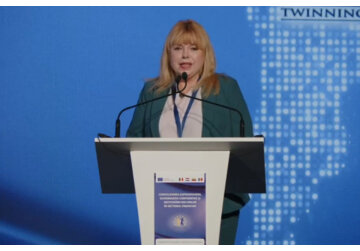
In Moldova, a twinning project for the NBM and the NCFM was successfully completed, for the implementation of which the European Union allocated 1.73 million euros.
It's about the twinning project “Strengthening supervision, corporate governance and risk management in the financial sector”, funded by the European Union. As noted at the final event on Tuesday, the most important achievements of this project were: the creation of a new macroprudential policy strategy; bringing rules in the field of insurance and non-bank lending into compliance with EU Directives; adjusting the rules for monitoring the financial market infrastructure and preparing a dossier for Moldova’s accession to the Single Euro Payments Area (SEPA). President of the National Bank of Moldova Anca Dragu noted that thanks to European assistance, the NBM has made significant progress in bringing financial market supervision instruments into line with European norms and standards. “We delivered tangible results to market participants and managed to prepare well for the SEPA accession dossier, which was recently sent to the European Payments Council. Time to move on. This year we strive to obtain a positive assessment of the equivalence of banking legislation with European legislation in accordance with the methodology of the European Banking Authority, so that the attractiveness of the Moldovan banking sector for EU investors and the stability of the financial system as a whole will increase,” emphasized the President of the National Bank of Moldova. The EU-funded twinning project “Strengthening supervision, corporate governance and risk management in the financial sector” was implemented over 2.5 years with the support of a consortium formed by the National Bank of Romania (NBR) as the project leader, together with the Dutch Bank (De Nederlandsche Bank - DNB ) and the Bank of Lithuania (Lietuvos Bankas - LB) as junior partners, with the participation of experts from the Financial Supervisory Authority and the National Authority for Consumer Protection of Romania. Another beneficiary of this project in Moldova was the National Commission for the Financial Market. Vice President of the National Bank of Romania Leonardo Badea emphasized that thanks to this project, the National Bank of Moldova has gone through an impressive path of transformation and reform. “Starting with the development of the Macroprudential Policy Strategy, the development of a stress testing system, the necessary regulations in the field of the insurance sector and payment system infrastructure, continuing with the development of methodologies and regulations necessary for the supervision of non-bank credit institutions, increasing institutional capacity and strengthening financial stability and, finally, preparing the dossier for accession to the Single Euro Payments Area, we have witnessed the commitment and perseverance of your teams in achieving significant progress in a relatively short period of time,” he said. “We are proud to have contributed to the success of this project together with our partners from Romania and Lithuania. We will remain with the National Bank of Moldova in the future through technical cooperation instruments,” said, in turn, the President of the Central Bank of the Netherlands, Klaas Knot. At the same time, Vice President of the Bank of Lithuania Asta Kuniyoshi noted that thanks to the collective efforts of all participants in the twinning project, significant results were achieved. “Improving risk management tools in both the insurance and banking sectors will lead the National Bank of Moldova and the supervisory authority on a successful path towards a more sustainable economy. The decisive factor in promoting the project was the commitment, professionalism and participation of our colleagues from Moldova, both at the expert and management level,” she said. “The EU has invested €1.73 million in the twinning project to achieve long-term structural reforms that will benefit both citizens and companies. Together we managed to improve the organization and management of the financial sector, increase confidence in its stability and, finally, help the country move closer to EU membership,” said Adam Grodzicki, Deputy Head of Cooperation within the EU Delegation to Moldova. The official part of the event continued with a presentation session, during which the efforts and progress achieved within the project, as well as their impact on the financial sector, were analyzed. The overall objective of the project was to support Moldova in implementing reforms related to the EU-Moldova Association Agreement/Deep and Comprehensive Free Trade Agreement (DCFTA) and the Association Agenda, and the specific objective was to strengthen oversight, corporate governance and governance risks in the financial sector. During the 30 months of implementation of the project, a number of 139 short-term expert technical assistance missions were carried out, including training sessions conducted over approximately 1,000 working days and 15 study visits to Romania and Lithuania. The most important results of the project are: development and approval of a new macroprudential policy strategy; development of a framework for a macroprudential stress testing model; improving the quality of the Financial Stability Report of the National Bank of Moldova; development of primary and secondary insurance and reinsurance frameworks, as well as a system of civil liability insurance for motor vehicle owners in accordance with the EU Solvency II and MPTL Directives; development of regulations necessary for supervision of the sector of non-bank credit organizations; training of NBM employees responsible for supervision of non-bank credit organizations; development and approval of NBM rules regarding activities for monitoring financial market infrastructure and payments, including amendments to three laws to bring them into line with international best practices and EU legislation; training of NBM employees responsible for monitoring the financial market infrastructure and payment systems; preparation of a dossier on Moldova’s accession to the Single Euro Payments Area, which was presented to the European Payments Committee on January 30, 2024. The project paid great attention to employee training, while the exchange of experience with experts led to both improved knowledge in this area and adoption of EU best practices. As noted in the NBM, the impact of the results of the twinning project is to strengthen and diversify macroprudential supervision instruments, increase the security and efficiency of payment and settlement systems necessary for the financial stability of the country, which will provide opportunities for local and foreign investors to participate in the sustainable development of the local financial market, with high level of security, with high-quality financial products and services that best meet the current needs of various categories of consumers and clients. In addition, strengthening the regulatory framework, as well as the authorization and supervision process associated with the activities of non-bank credit organizations, helps improve the business environment, strengthen investor confidence and facilitate banking intermediation. Regarding the introduction of a new legal framework and the application of new practices of risk-based supervision in the supervisory activities of the insurance sector, this will increase the competitiveness of insurance companies and their services, and the beneficiaries of the project, in addition to the employees of the NBM, the banking and non-banking community of Moldova, will finally be citizens of the Republic of Moldova, which will have a viable, stable and secure financial sector. // 19.03.2024 — InfoMarket.







